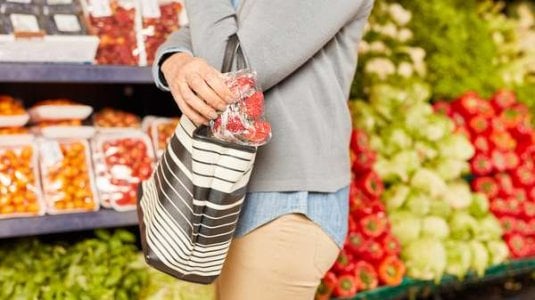This supermarket self-checkout ‘trick’ could land you in trouble!
By
- Replies 66
When times are tough, it’s only natural to look for ways to save money. But one woman from South Australia was recently warned that her so-called self-checkout ‘trick’ isn’t just unethical–it’s completely illegal.
A question was submitted to the Sisters In Law column on news.com.au, where a woman named Kayla asked law firm Maurice Blackburn's resident lawyers and real-life sisters Alison and Jillian Barrett a rather thought-provoking question.
Apparently, her friend was putting more expensive items through self-checkouts as something less pricey, like swapping avocados for brown onions.
Kayla wrote: 'She claims that it’s not stealing as you’re still paying for something and that supermarkets work the cost of ‘self-checkout fraud’ into their prices. She also claims that everyone does it!'
The Barretts responded: 'No matter how your friend tries to justify her behaviour, it is against the law. Her fraudulent behaviour is just one of many tricks employed by self-service thieves to avoid proper payment.'
These sneaky tactics can push up grocery prices for everyone, the duo stressed, which is why supermarkets are taking active measures to prevent self-checkout thefts by employing undercover security officers.
Things could get pretty uncomfortable for a shoplifter caught in the act.
‘If they believe a theft has occurred, security officers and store staff have the right to search your friend’s bags to check the goods and the prices paid,’ the Barretts warned.
‘An excuse like getting avocados confused with brown onions is likely not going to cut it.’
‘Your friend has the right to refuse a search, but the grocery store can call the police if they suspect she has been dishonest.’
Shoplifting, including underpayment of goods, is a type of larceny (theft) under South Australian law.
Minor incidences (involving goods valued at less than $150) are usually dealt with by the police in the form of an on-the-spot infringement notice, provided that the supermarket consents.
’This includes the requirement to pay the full price for the goods stolen (or underpaid), as well as an apology to the store,’ the sisters added.
‘It's tough out there, but breaking the law by not paying for your food isn't really good for anyone.’
There’s no doubt about it–money can be tight these days. But breaking the law to save a few bucks just isn’t worth the risk.

Do you think the woman’s reason for tricking the supermarket’s self-checkout feature is justified? What would you have done differently if you were in her position? We want to hear your input in the comments below!
A question was submitted to the Sisters In Law column on news.com.au, where a woman named Kayla asked law firm Maurice Blackburn's resident lawyers and real-life sisters Alison and Jillian Barrett a rather thought-provoking question.
Apparently, her friend was putting more expensive items through self-checkouts as something less pricey, like swapping avocados for brown onions.
Kayla wrote: 'She claims that it’s not stealing as you’re still paying for something and that supermarkets work the cost of ‘self-checkout fraud’ into their prices. She also claims that everyone does it!'
The Barretts responded: 'No matter how your friend tries to justify her behaviour, it is against the law. Her fraudulent behaviour is just one of many tricks employed by self-service thieves to avoid proper payment.'
These sneaky tactics can push up grocery prices for everyone, the duo stressed, which is why supermarkets are taking active measures to prevent self-checkout thefts by employing undercover security officers.
Things could get pretty uncomfortable for a shoplifter caught in the act.
‘If they believe a theft has occurred, security officers and store staff have the right to search your friend’s bags to check the goods and the prices paid,’ the Barretts warned.
‘An excuse like getting avocados confused with brown onions is likely not going to cut it.’
‘Your friend has the right to refuse a search, but the grocery store can call the police if they suspect she has been dishonest.’
Shoplifting, including underpayment of goods, is a type of larceny (theft) under South Australian law.
Minor incidences (involving goods valued at less than $150) are usually dealt with by the police in the form of an on-the-spot infringement notice, provided that the supermarket consents.
’This includes the requirement to pay the full price for the goods stolen (or underpaid), as well as an apology to the store,’ the sisters added.
‘It's tough out there, but breaking the law by not paying for your food isn't really good for anyone.’
There’s no doubt about it–money can be tight these days. But breaking the law to save a few bucks just isn’t worth the risk.
Key Takeaways
- A South Australian woman has allegedly been committing 'self-check-out fraud' at her local supermarket, according to her friend.
- The woman reportedly mislabels expensive items as cheaper ones at the self-checkout, a practice she justifies by asserting that supermarkets work the cost of such fraud into their prices.
- Lawyers Alison and Jillian Barrett responded to this inquiry in news.com.au's Sisters In Law column, asserting that such behaviour is not justifiable and contributes to increased grocery prices.
- They warned that undercover security officers are employed by supermarkets to deal with issues such as these, and such behaviour could result in an on-the-spot theft infringement notice, including a requirement to pay the full value of the underpaid goods and an apology to the store.
Do you think the woman’s reason for tricking the supermarket’s self-checkout feature is justified? What would you have done differently if you were in her position? We want to hear your input in the comments below!









